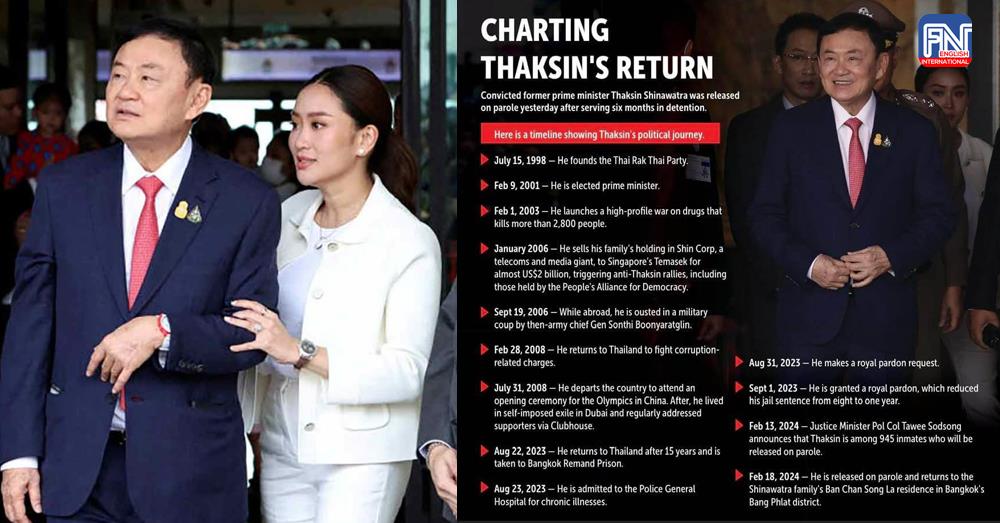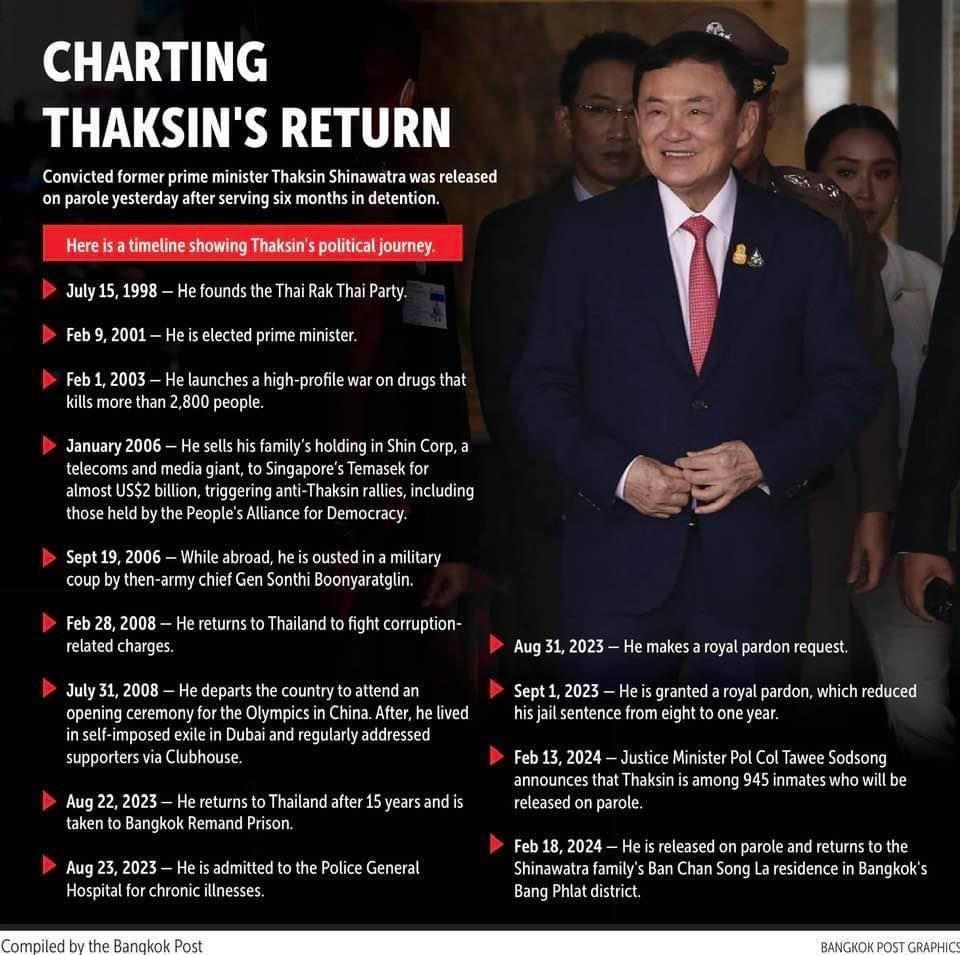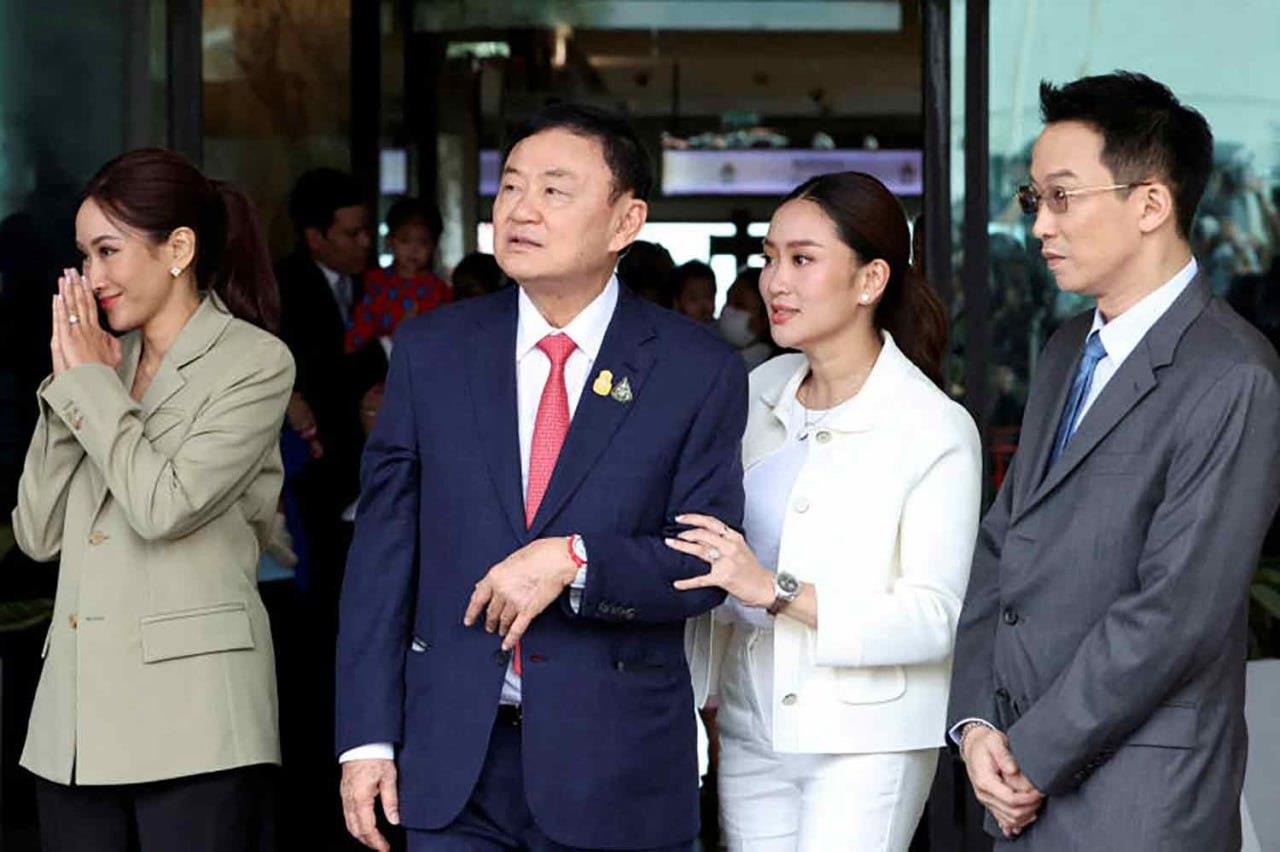BANGKOK, Feb. 19 (Bangkok Post) – Thailand's controversial billionaire former Prime Minister Thaksin Shinawatra was released on parole on Sunday after serving six months in detention.
Here is a timeline of his political career.
1998
Thaksin founds the Thai Rak Thai (Thais Love Thais) party.
2001
Thaksin is elected prime minister, expanding spending on healthcare, rural development and farming subsidies, his “Thaksinomics” for the poor.
2003
Thaksin launches a high-profile war on drugs during which, critics say, more than 2,500 people were summarily executed.
2005
Thaksin’s party wins another landslide election, increasing its share of seats in the 500-member lower House of Representatives to 377.
2006
An anti-Thaksin protest movement, the People's Alliance for Democracy, gains momentum after the Shinawatra family sells its telecommunications firm, Shin Corporation, to Singapore sovereign fund Temasek tax-free, using a capital gains loophole. Protesters also point to issues of conflict of interest.
In September, the military launches a coup against Thaksin while he is overseas, citing the need to end the protests.
2007
Thai Rak Thai is disbanded after the coup for electoral fraud and 111 of its senior members, Thaksin among them, is barred from politics for five years
Instead of fighting the corruption charges, which he says are politically motivated, Thaksin skips bail and goes into self-exile, initially in Britain.
In July, he buys English Premier League team Manchester City for copy64 million, pleasing soccer-mad Thais. His critics call the purchase a political gimmick.
In December, Thaksin-backed People's Power Party wins 233 out of 480 parliamentary seats in a general election.
2008
He flies back to Bangkok to defend himself against corruption charges after his ally successfully formed a government at the start of the year. In August, Thaksin skips bail and flees to London.
Anti-Thaksin protesters close down two of Bangkok's international airports in December, after crippling a pro-Thaksin government for months with street protests and months-long occupation of the seat of government in Bangkok.
The Thaksin-backed People's Power Party is disbanded for electoral fraud.
2009
Pro-Thaksin demonstrators led by the United Front for Democracy Against Dictatorship, also known as "Red Shirts", begin protests against the government, calling it unelected and illegitimate.
2010
The Red Shirt protests paralyse Bangkok for months until a military crackdown, in which at least 90 people are killed in clashes with security forces in Thailand's worst political violence since 1992.
2011
New elections are won in a landslide by another new pro-Thaksin party, Pheu Thai. Thaksin's younger sister, Yingluck Shinawatra, becomes prime minister.
2013
Anti-government protesters, led by a leading figure from the Democrat Party, choke the streets of Bangkok after Yingluck's government introduces an amnesty bill that could have led to Thaksin's return. The protests go on for months.
2014
Yingluck's government is overthrown in the military's 13th successful coup since the country became a constitutional monarchy in 1932.
2023
Thaksin receives a rock star reception as a fugitive on his return to Thailand, with crowds cheering his arrival by private jet and policemen saluting him before escorting him to court and then jail. He is taken to hospital on his first night, with officials citing concern about his heart and blood pressure.
His return coincides with ally and political newcomer Srettha Thavisin being chosen as prime minister on the same day.
Thaksin applies for a royal pardon and his eight-year jail term is commuted to a year by the king.
February 2024
Thaksin is granted parole after serving six months in hospital detention, on the grounds of his age, health condition and time served.


Photo from Bangkok Post

Photo from Reuters